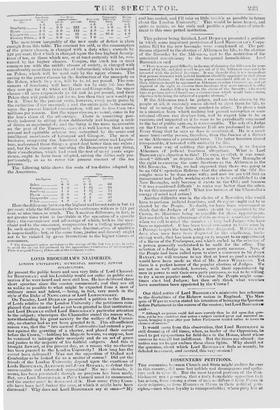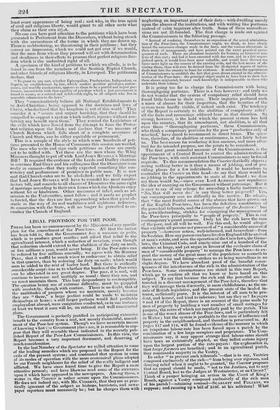DISSENTERS' PETITIONS.
THE connexioa between Church and State might endure for ever in this country, eiti none but infidels and demagogues and spoliators seek to sever it. But the most bigoted partisan of' the Establishment mu -t perceive, that a truly formidable opposition t I it has arisen, from among a class of inen as differeet from P.1 NE in their religious, as from HOBBES or HUME in their plifical penciples,—men whose loyalty is unimpeachable; whose piety ht's at
least every appearance of being real ; and who, in the true spirit of civil and religious liberty, would grant to all other sects what they claim as their own rigat.
No one can have paid attention to the petitions which have been presented to Parliament from the Dissenters, without being struck with the earnestness of the terms in which they are drawn up. There is no blustering, no threatening in their petitions ; but they convey an impression, which we could not get over if we would, that the men from whom they proceed will act with determination and steadiness in their efforts to procure that perfect religious freedotu which is the undoubted right of all. A specimen of the kind of petitions to which we allude, is to be found in one from the members of the Scottish Baptist Church, and other friends of religious liberty, in Liverpool. The petitioners declare, that
"To grant to any sect, whether Episcopalian, Presbyterian, Independent, or Baptist, an establishment by law, which confers peculiar privileges, endowments, and worldly emoluments, appears to them to be a partial and unjust preference, inconsistent with that equality of privilege which a just government is bound to secure, as a natural and indefeasible right, to all subjects who live in peaceable submission to the laws."
They "conscientiously believe all National Establishments to be Anti-Christian ; being opposed to the doctrines and laws of Christ, who declared that his kingdom is not of this world." They consider it a " severe and unjust hardship, that they should be compelled to support a system which inflicts injuries without conferring any benefit upon them." They remind the Legislature of the evils which have flowed from the attempt to force the Protestant religion upon the Irish ; and exclare that "110 measure of Church Reform which falls short of a complete severance of Church and State, can be either equitable or permanent."
This is a sample of the style in which some hundreds of petitions presented to the House of Commons this session are worded. The men who write and sign such petitions as these are surely
not to be trifled with. Yet these are the men whom the Whig Ministers thought to put off with Lord JOHN RUSSELL'S Marriage
Bill 1 It required the evidence of the Leeds and Dudley elections
to convince Earl GREY and his colleagues that the Dissenters were saally in earnest—that they really expected something like con
sistency and performance of promises in public men. It is now
said that Church-rates are to be abolished ; and we fully expect that Lord JOHN RUSSELL will have to remodel his most unsatis
factory bill, and concede to all classes of Dissenters the same right of marriage according to their own forms which the Quakers enjoy without let or hindrance. Other measures of relief', such as ad
mission to the Universities, must follow : and it needs no prophet to foretcl, that the days are fast approaching when that great obstacle in the way of its real usefulness and righteous influence, its connexion with the State, will no longer be permitted to encumber the Church of England.

















 Previous page
Previous page